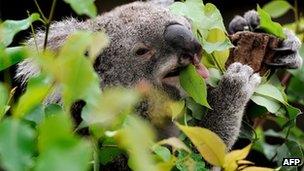Australia lists the koala as 'vulnerable' species
- Published

The koala population in parts of Australia has been dwindling over the years
Australia has listed the koala as a threatened species in parts of the country due to its dwindling population, officials say.
Environment Minister Tony Burke said koalas in Queensland, New South Wales and the Australian Capital Territory are now considered "vulnerable".
Habitat loss, urban expansion, vehicle strikes, dog attacks and disease have contributed to their dwindling numbers.
But conservationists say the declaration should have been national.
Contrary to popular belief, koalas, which are native to Australia, are marsupials and not bears. They only eat the leaves of the eucalyptus tree and sleep for up to 20 hours a day.
Tourist icon
The current size of the koala population is unclear, according to the BBC's Phil Mercer, with estimates varying from several hundred thousand to as few as 43,000.
In New South Wales and Queensland, the numbers have fallen by as much as 40% since 1990.
<link> <caption>Mr Burke said that the decision to list the koala</caption> <url href="http://www.environment.gov.au/minister/burke/2012/mr20120430.html" platform="highweb"/> </link> "follows a rigorous scientific assessment" by a committee that deals with threatened species.
"We're talking about a species that is not only iconic in Australia, but is known worldwide, a species that has taken a massive hit over the last 20 years and we can't wait any longer before we turn the corner when the scientists are telling us the evidence is in," he said.
But not all parts of Australia will be affected by the listing. Koalas are thriving in the states of Victoria and South Australia.
"Koala numbers vary significantly across the country, so while koala populations are clearly declining in some areas, there are large, stable or even increasing populations in other areas," Mr Burke said.
However, Deborah Tabart from the non-profit Australian Koala Foundation believes that there should be blanket protection for koalas in the country.
She said that "the koala is such an important tourist icon and such an important symbol to Australia".
- Published29 April 2012
- Published27 July 2010